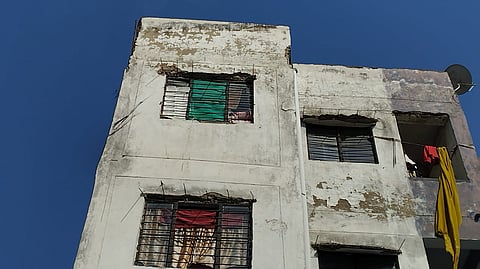
Lucknow- The state capital witnessed the birthday celebrations of Kanshiram by Ambedkarites, particularly the Bahujan Samaj Party supporters. Followers of the BSP founder gathered from all over the state to pay their tributes at the Kanshiram Smarak Sthal in Lucknow.
The Mooknayak embarked on a trip to visit Kanshiram Colony to ascertain whether the residents remember and celebrate their Nayak, on whose name the settlement was created. However, disappointment was all we encountered. Inhabited predominantly by marginalized communities, particularly individuals from the SC community, Kanshiram Colony also accommodates numerous Muslim families.
Arriving at Kanshiram Colony in the Hans Khera area of Lucknow, the Mooknayak set out to observe the fabric of this settlement, established during the BSP's governance from 2007 to 2012.
As we step into the colony, our gaze is drawn to a troubling sight - iron bars jutting out from the buildings, some adorned with stones lodged within them.
Amidst this scene, children play, their laughter echoing through the dilapidated surroundings. An encounter with Ansh, a fifth-grade student, sheds light on the residents' struggles.
While aware of the colony's name, Ansh remains unaware of Kanshiram's significance. His lament about a recent ledge collapse, resulting in his uncle's injury and subsequent disability, paints a poignant picture of the challenges faced by the colony's inhabitants.
Raju Sonkar, a vegetable seller, says he knows Kanshiram, "it is because of him that we got the colonies." He says that nothing is observed here, not even Ambedkar Jayanti. On being asked about the condition of the colony, he says that the construction is falling apart, and many people have left the colony. The only government scheme that he is aware of is the 5 Kg food grains that he receives.
On moving further, we see unsightly garbage strewn across the road smelling badly. "No one comes to collect the waste," complains one lady. "We have conveyed our grievances to the local corporator and other authorities, but to no avail," she adds, expressing her inability to speak further as she is observing Roza (fast observed by the Muslim community during the Ramzan month).
We speak to Parvati, a widow who lives in the next block. "Kanshiram is the Chief Minister," replies the middle-aged woman when asked about the leader. She rephrases her answer and says that the area is insufficiently lit, creating problems for the female residents of the colony.
Subhash Chandra Gupta, a vegetable trader, is aware of Kanshiram and the party he founded, but he is not sure about the Kanshiram Jayanti. Gupta reveals that quarters have been allotted to non-deserving and well-to-do people. "People have purchased 3-4 quarters here and have sub-let on rent.
On craning the neck, we see hallmarks of a worn-out settlement neglected by authorities - plaster chipping away, broken doors, etc. "Seepage is a big problem here," says a lady who lives as a tenant in a quarter behind it.
Escorted by the lady, whose husband makes a living as a cart-seller, we ascend to the rooftop. The staircase, worn by time, shows signs of erosion as the plaster peels away. From this vantage point, we are confronted with a disheartening sight - the roof is overrun with weeds, mirroring the neglect evident throughout the colony.
As we take in the scene, the lady highlights the recurring issue of sewage pipe leaks, permeating the air with a putrid odour. From this elevated perspective, the true extent of the colony's dilapidation becomes evident. The buildings, barely 12–13 years old, wear a weary appearance, casting doubt on their ability to endure for another decade.
The striking resemblance between the colony's condition and the struggles of the political party founded by Kanshiram four decades ago is not lost on us. Both appear rickety, locked in a battle for survival against neglect and indifference.
Despite their hardships, the residents cling to hope, believing that the attention of media could bring about positive change. With a sense of optimism, we depart from the colony, carrying with us the residents' aspirations for a better future.
Also Read-
You can also join our WhatsApp group to get premium and selected news of The Mooknayak on WhatsApp. Click here to join the WhatsApp group.